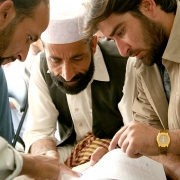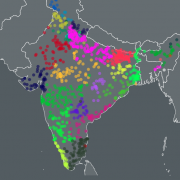Everything is up in the air! No one knows what’s going to happen next! At Quirk Global Strategies, we’re used to unpredictability.
We’ve developed strategies to manage it. No matter where in the world we’re working, every project starts with a discussion of the research goals. What questions need to be answered? By whom? How will the research be used? When? Answering these basic questions lays the foundation for the project and makes it easier to answer more complicated design questions down the road. This process helps us adjust our research plans to changing circumstances.

A meter apart, ladies
All survey research is a snapshot in time. Using it to predict views in the future is always a mistake. In the Coronavirus era, when the long term social, health and economic impacts have yet to fully hit, trying to use today’s data to predict what people will be thinking in months, or even weeks, is a waste of money.
Views on issues can be harder to shift than you’d think. As a political pollster in the US in September 2001, I assumed that the 9/11 attack was the kind of event that would radically shift perceptions on political topics. After the initial feelings of fear and insecurity wore off, pollsters found that voters’ priorities for elected officials or party preferences had changed little. This is the closest analogy in my political career to what we’re facing now. We can expect the economic and social impacts of COVID-19 will likely be much more far reaching than 9/11’s. But right now, we just don’t know.
Once you decide on the goals of your research, ask yourself these questions:
Do You Need to Know Now?
If you need to understand how the current environment is shaping public opinion on a policy question today, or if you need to know how consumers have adapted their behavior to physical distancing, you should consider moving forward. If you’re planning to launch an advocacy campaign in six months or a year, you should probably wait, especially if you have limited resources to change your strategy or go in the field again.
Do You Have the Resources to Respond to the Findings?
There’s nothing worse than binning a costly research project because the landscape has shifted, rendering your data useless. Can your plan be changed if the data reveal something unexpected or counterintuitive? If the answer is no, you should wait. Good research often reveals such findings, particularly in an uncertain environment. It’s wasted if you can’t incorporate it.
Do You Have the Resources to Poll Again?
For many campaigns, knowing what people are thinking right now, at the beginning of the crisis, is critical information. A snapshot of attitudes in Spring 2020 will provide a baseline for tracking attitudinal shifts later in this year and in the years to come. It might also reflect the “worst case scenario” for your issue, which is useful to know when preparing a campaign. Depending on your timeline and your goal, you will probably need to poll again to update your assumptions. Add that to your budget.
Is Some Data Better Than No Data?
In the difficult environments where QGS typically works, we don’t let the perfect be the enemy of the good. We always operate under budgetary, security and time restrictions that force us to make concessions. But since we fully understand the goals of each project, we know which methodological trade-offs we can live with and which we cannot. We adjust our sampling plan to adapt to realities on the ground, report our methodology transparently and adjust our analysis and strategic recommendations accordingly. If you need actionable data, even if it’s not perfect, you have more flexibility in your data collection options.
Who Do You Need to Talk to?
The answer to this question will help you decide which data collection mode is optimal, given your research goal.

None of this, sorry
If you need a large, proportionate, general population sample in a country where the only way to collect data is via face-to face-interviews, you’ll need to wait. Face-to-face interviews and traditional focus groups are simply off the table right now. Sadly, it’s impossible to predict when interviewers will be able to go out in the field and discussants can sit around a table talking to a live moderator.
The good news is telephone survey research to mobiles and landlines is thriving in Europe, the Gulf and North America. Interviewers stationed safely at home are calling voter file or RDD samples, like always. There are even anecdotal reports of marginal response rate improvements. If your universe has high mobile/landline penetration, phone surveys remain the best way to collect a random sample of a general population universe.
Data collectors in many middle- and low-income countries are on the cusp of being able to field random sample mobile surveys, particularly of urban populations. Before we commit to this approach, however, we need a full understanding of which groups are underrepresented (usually older, rural, lower SES) and which are overrepresented (younger, urban, higher SES) in these samples. We pay particular attention to the gender split: In some places it’s easier to interview women on the phone than in person. In others, men control access to the mobile phone. Then we decide, based on the goals of the research, if we can live with the trade-off.
Non-Probability Options Abound
If you’re interested in non-random views of urban, younger, educated, higher SES, respondents with mobile phones or internet access, there is no shortage of methodologies available. This is particularly true in high- and middle-income countries but these populations are accessible even in many low-income countries via panels as well. Methodologies such as online surveys, SMS surveys, IVR and social media analytics can also be combined to give a richer, more contextual view of the landscape. Keep in mind, these modes sacrifice randomness and are not a substitute for a proportional sample. Review the research goal then decide if it matters.
Quirk Global Strategies Can Help
So should you poll now? Return to the goal of your research. Look at your budget and decide which trade-offs you can tolerate and the ones you cannot. Email us and we can help you think through your options and suggest the best one. We might even suggest waiting.









